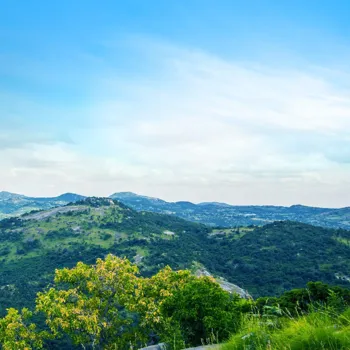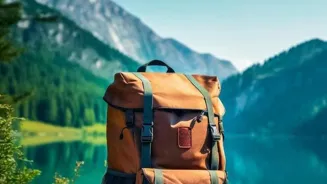Discover essential tips for safe travels in India. Stay informed, secure, and enjoy a worry-free adventure. Read on!
Planning a holiday? Exciting, isn't it? But before you pack your bags and dream of scenic
landscapes and delicious local food, let's talk about something crucial: staying safe.
Whether you're backpacking through the Himalayas, exploring the backwaters of Kerala, or visiting historical sites in Rajasthan, your safety should be your top priority. No need to get paranoid, just prepared!
Here are eight essential tips to help you navigate your next Indian adventure with confidence and peace of mind. These tips are practical and easy to implement, ensuring a safer and more enjoyable experience. Remember a little precaution goes a long way in securing your well being.
Research destination, inform trusted contact, secure docs, get travel insurance for stress-free trip
Before you even book your tickets, spend some time researching your destination. Understand the local customs, traditions, and any potential safety concerns. Check travel advisories issued by the government for any specific warnings or recommendations.

Share your itinerary with a trusted friend or family member. This way, someone knows your whereabouts and can raise an alarm if needed.
Make digital copies of your important documents, such as your passport, visa, and identification cards, and store them securely online or in a password-protected folder. This also allows for easier access for you.
Consider purchasing travel insurance that covers medical emergencies, trip cancellations, and lost or stolen belongings. Knowing that you're covered for unexpected events can significantly reduce stress during your trip and allow you to enjoy more.
Blend in with local culture, avoid attention, show respect, stay safe while traveling
While it's tempting to embrace your tourist spirit, try to blend in with the local culture as much as possible. Avoid wearing flashy jewelry or carrying expensive gadgets that might attract unwanted attention. Dress modestly, especially when visiting religious sites or conservative areas.
Learn a few basic phrases in the local language. Even a simple "Namaste" or "Dhanyavad" can go a long way in building rapport with locals and showing respect for their culture. Be mindful of your surroundings and avoid drawing attention to yourself.
Project confidence and awareness, as this can deter potential wrong-doers. Act like you know where you're going, even if you don't, and avoid looking lost or confused. By blending in you’d be better able to take advantage of all the sights!
Stay vigilant in crowded areas, secure belongings to avoid theft
Be extra cautious with your belongings, especially in crowded areas like markets, railway stations, and public transportation. Use a crossbody bag or a money belt to keep your valuables close to your body. Avoid keeping large sums of money in one place.
Distribute your cash and credit cards in different pockets or bags. Be wary of pickpockets and scams. Never leave your belongings unattended, even for a short period. Use a secure backpack with hidden zippers and compartments to protect your valuables from theft.
Remember that crowded places are a magnet for petty crime, so be vigilant and aware of your surroundings. Keep important items close.
Choose safe transportation: pre-paid taxis, ride-shares, check credentials, share ride details, stay cautious
When it comes to transportation, choose reputable and reliable options. Opt for pre-paid taxis or ride-sharing services instead of hailing random taxis on the street. Always check the vehicle and the driver's credentials before getting in. Share your ride details with a friend or family member.
If taking public transportation, be aware of your surroundings and keep your belongings close. Avoid traveling alone at night, especially in unfamiliar areas. Be cautious of over friendly strangers offering rides or assistance. Stick to well-lit and populated areas when walking at night.
Ensure the driver is going to the destination you put up. If possible, use services that allow tracking
Choose safe accommodations, read reviews, use secure locks, stay cautious, report concerns
Choose accommodation in safe and well-located areas. Read reviews and ratings of hotels or guesthouses before booking. Ensure that your room has a secure lock and a peephole. Be cautious of opening the door to strangers. Use the hotel safe to store your valuables.
When checking in, ask for a room away from the ground floor to deter potential break-ins. Always be aware of your surroundings within the hotel premises. Avoid disclosing your room number to strangers. If you feel uncomfortable or suspicious, report it to the hotel management immediately.
It’s better to be safe than sorry when it comes to your accommodation.
Consult doctor, pack meds, stay safe, hydrate, insurance is key
Before your trip, consult your doctor about necessary vaccinations and medications. Carry a basic first-aid kit with essentials like antiseptic wipes, band-aids, pain relievers, and anti-diarrheal medication. Drink bottled water or boiled water only.
Avoid eating from street vendors who may not have proper hygiene standards. Be mindful of food safety. Wash your hands frequently with soap and water. Be aware of the symptoms of common travel illnesses and seek medical attention if needed. Stay hydrated, especially in hot and humid climates.
Avoid overexerting yourself in the heat. Travel insurance can be a lifesaver in case of medical emergencies.
Get a local SIM card for connectivity and safety while traveling
Purchase a local SIM card to stay connected and have easy access to internet. This will allow you to use maps, translation apps, and contact emergency services if needed. Download useful travel apps on your phone, such as maps, language translators, and emergency contact apps.
Keep your phone charged and carry a portable power bank. Share your location with trusted contacts. Let them know where you are and what your plans are. Stay in touch regularly to reassure them of your safety.
Having access to information and communication is key to staying safe and informed during your trip.
If something feels wrong, it probably is. Trust your intuition and don't hesitate to remove yourself from uncomfortable or suspicious situations, don't feel pressure to be to be polite when dealing with possible situations. Be assertive and say "no" if someone makes you feel uncomfortable or pressured. Avoid sharing personal information with strangers. Be wary of people who are overly friendly or helpful. If you feel threatened or unsafe, seek help from local authorities or other trusted individuals. Remember, your safety is paramount, and it's always better to err on the side of caution. It’s always better to trust your instincts.
Traveling in India can be an incredibly rewarding experience. By following these simple safety tips, you can minimize risks and enjoy a safe, memorable, and enriching journey. Remember to be aware, be prepared, and trust your instincts. Happy travels!
These tips will assist you in having a happy go lucky travel experience. Safe travels. Be aware of your surroundings and keep your belongings safe.
AI Generated Content. Glance/InMobi shall have no liability for the content












